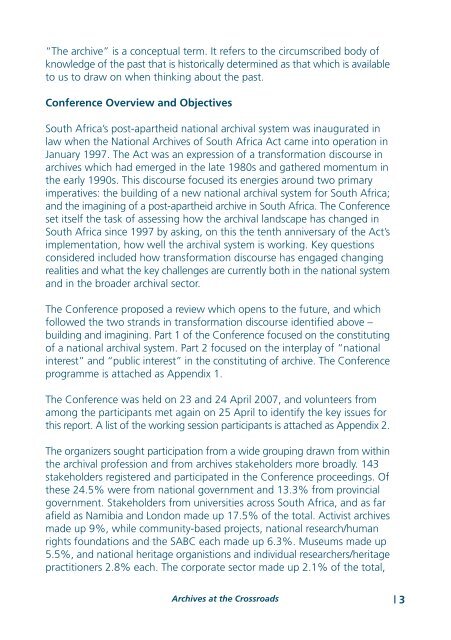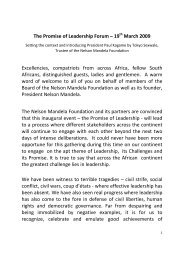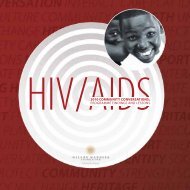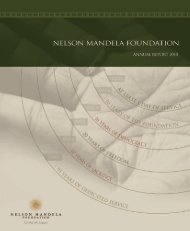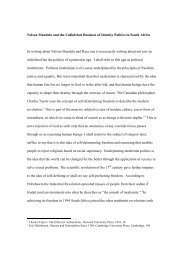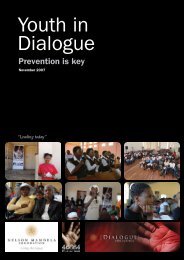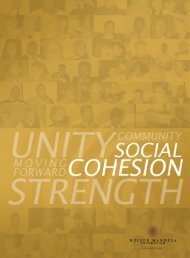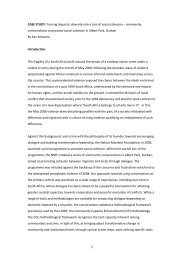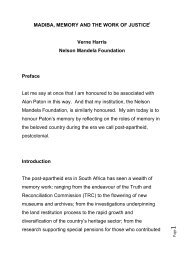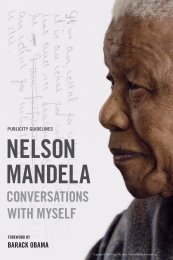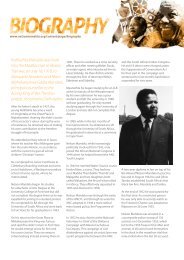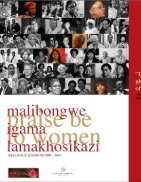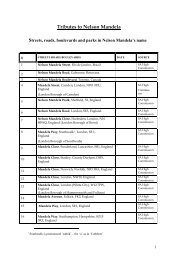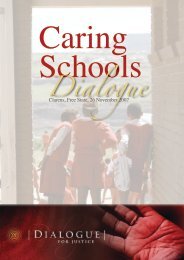Archives at the Crossroads 2007 - Nelson Mandela Foundation
Archives at the Crossroads 2007 - Nelson Mandela Foundation
Archives at the Crossroads 2007 - Nelson Mandela Foundation
- No tags were found...
You also want an ePaper? Increase the reach of your titles
YUMPU automatically turns print PDFs into web optimized ePapers that Google loves.
“The archive” is a conceptual term. It refers to <strong>the</strong> circumscribed body ofknowledge of <strong>the</strong> past th<strong>at</strong> is historically determined as th<strong>at</strong> which is availableto us to draw on when thinking about <strong>the</strong> past.Conference Overview and ObjectivesSouth Africa’s post-apar<strong>the</strong>id n<strong>at</strong>ional archival system was inaugur<strong>at</strong>ed inlaw when <strong>the</strong> N<strong>at</strong>ional <strong>Archives</strong> of South Africa Act came into oper<strong>at</strong>ion inJanuary 1997. The Act was an expression of a transform<strong>at</strong>ion discourse inarchives which had emerged in <strong>the</strong> l<strong>at</strong>e 1980s and g<strong>at</strong>hered momentum in<strong>the</strong> early 1990s. This discourse focused its energies around two primaryimper<strong>at</strong>ives: <strong>the</strong> building of a new n<strong>at</strong>ional archival system for South Africa;and <strong>the</strong> imagining of a post-apar<strong>the</strong>id archive in South Africa. The Conferenceset itself <strong>the</strong> task of assessing how <strong>the</strong> archival landscape has changed inSouth Africa since 1997 by asking, on this <strong>the</strong> tenth anniversary of <strong>the</strong> Act’simplement<strong>at</strong>ion, how well <strong>the</strong> archival system is working. Key questionsconsidered included how transform<strong>at</strong>ion discourse has engaged changingrealities and wh<strong>at</strong> <strong>the</strong> key challenges are currently both in <strong>the</strong> n<strong>at</strong>ional systemand in <strong>the</strong> broader archival sector.The Conference proposed a review which opens to <strong>the</strong> future, and whichfollowed <strong>the</strong> two strands in transform<strong>at</strong>ion discourse identified above –building and imagining. Part 1 of <strong>the</strong> Conference focused on <strong>the</strong> constitutingof a n<strong>at</strong>ional archival system. Part 2 focused on <strong>the</strong> interplay of “n<strong>at</strong>ionalinterest” and “public interest” in <strong>the</strong> constituting of archive. The Conferenceprogramme is <strong>at</strong>tached as Appendix 1.The Conference was held on 23 and 24 April <strong>2007</strong>, and volunteers fromamong <strong>the</strong> participants met again on 25 April to identify <strong>the</strong> key issues forthis report. A list of <strong>the</strong> working session participants is <strong>at</strong>tached as Appendix 2.The organizers sought particip<strong>at</strong>ion from a wide grouping drawn from within<strong>the</strong> archival profession and from archives stakeholders more broadly. 143stakeholders registered and particip<strong>at</strong>ed in <strong>the</strong> Conference proceedings. Of<strong>the</strong>se 24.5% were from n<strong>at</strong>ional government and 13.3% from provincialgovernment. Stakeholders from universities across South Africa, and as farafield as Namibia and London made up 17.5% of <strong>the</strong> total. Activist archivesmade up 9%, while community-based projects, n<strong>at</strong>ional research/humanrights found<strong>at</strong>ions and <strong>the</strong> SABC each made up 6.3%. Museums made up5.5%, and n<strong>at</strong>ional heritage organistions and individual researchers/heritagepractitioners 2.8% each. The corpor<strong>at</strong>e sector made up 2.1% of <strong>the</strong> total,<strong>Archives</strong> <strong>at</strong> <strong>the</strong> <strong>Crossroads</strong> | 3


